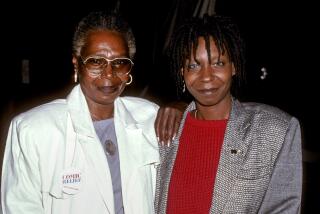‘Sarafina!’ Draws Cheers in South African Bow
- Share via
JOHANNESBURG, South Africa — “Sarafina!,” the new musical film starring Whoopi Goldberg, had its South African premiere Tuesday, and drew strong applause from an invited audience of anti-apartheid luminaries including African National Congress President Nelson Mandela.
In an emotional tribute to the movie, Mandela told the audience that “Sarafina!,” a fictional film based on the June 16, 1976, student uprising in Soweto, is not only a reminder of the past but a challenge for the future.
“The verdict of June 16 is clear--apartheid has failed,” Mandela said after the Tuesday screening. “The story is still being told and impacting on new generations in faraway lands. Here is the spirit of freedom. The youth are still demanding freedom.”
The film, loosely based on Mbongeni Ngema’s hit Broadway musical, “tells of hope and courage and the triumph of the human spirit,” Mandela said. “ ‘Sarafina!’ speaks of today and yesterday,” Mandela added. “It is up to us to see that it speaks for tomorrow.”
“Sarafina!” is the story of a young black girl, played by South African Leleti Khumalo, who adopts a campaign of resistance against the police presence in Soweto schools. She imagines the support of Mandela, who is her inspiration, and she is guided by a sympathetic teacher, played by Goldberg.
The ANC leader recalled how he and his colleagues in prison learned of the 1976 student protests, which were triggered by a revolt over the use of Afrikaans, the language of South Africa’s white rulers, as a medium of instruction in schools. Students flooded the streets of Soweto that day and police opened fire, killing several dozen and touching off months of rioting countrywide.
“The prison walls could not keep this information from us,” Mandela said. And he said news of the sacrifices made by black youth had heartened the imprisoned anti-apartheid leaders and “changed the course of our history.”
June 16 is one of the most important dates on the anti-apartheid calendar. The uprising, which occurred 15 years after Mandela went to jail, was the beginning of a chaotic decade in South Africa, culminating in a four-year state of emergency that ended soon after Mandela’s release in 1990.
More to Read
Only good movies
Get the Indie Focus newsletter, Mark Olsen's weekly guide to the world of cinema.
You may occasionally receive promotional content from the Los Angeles Times.










